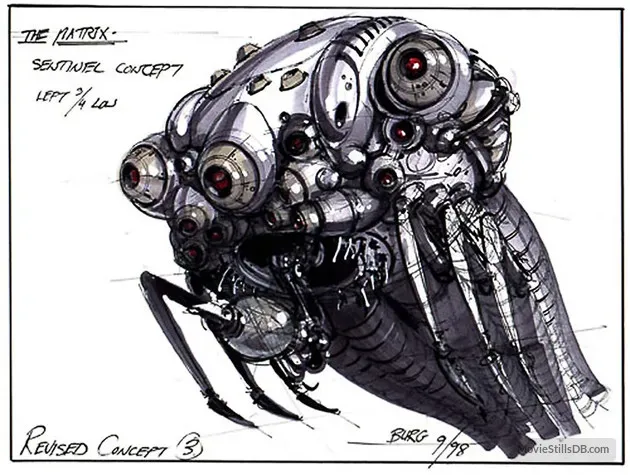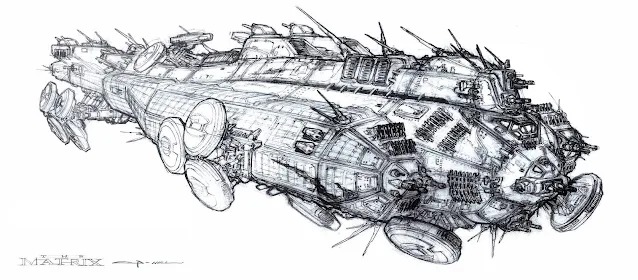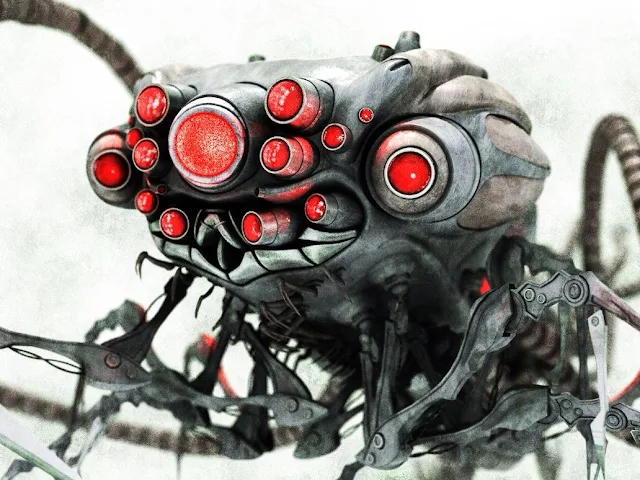The Matrix films are a captivating exploration of the nature of reality, identity, and freedom. Set in a dystopian future where humanity is trapped in a simulated reality called the Matrix, the films invite us to question our assumptions about what is real and what is not.
At the heart of the Matrix films is the idea that reality as we know it is an illusion created by machines to keep humanity in a state of slavery. This concept raises profound questions about the nature of reality itself, and challenges us to think about the relationship between perception and truth.
Are our perceptions of the world around us accurate, or are they merely a product of the systems that govern our lives?
This challenges viewers to question their own perceptions of reality and to consider the implications of living in a world where technology can create simulated realities that are indistinguishable from the real thing.
Here are some key themes of the Matrix trilogy:
Reality and Perception
In The Matrix, the audience is introduced to the idea that the world as we know it is a simulated reality, created by intelligent machines to keep humans under control. This concept is first introduced through the character of Morpheus, who tells Neo, the protagonist, that the world he knows is a computer program, and that he is living in a dream world. The theme of reality and perception is central to the film, as Neo gradually comes to realize that his perceptions of the world are not real.
The theme is further explored in The Matrix Reloaded, where Neo begins to question the nature of his reality, wondering if he is truly in control of his actions or if they are predetermined. This idea is echoed in the character of the Oracle, who tells Neo that he must make a choice between following his predetermined path or forging his own destiny. This theme of free will and determinism is closely linked to the idea of reality and perception, as Neo struggles to understand the true nature of his reality and his role within it.
The final film in the trilogy, The Matrix Revolutions, also deals with the theme of reality and perception, as Neo battles to save both the simulated world of the Matrix and the real world outside of it. The film explores the idea that reality is subjective and that perceptions can be altered, as the machines attempt to deceive Neo by creating false realities for him to navigate.
Throughout the trilogy, the theme of reality and perception is used to challenge the audience's assumptions about what is real and to encourage them to question the nature of their own reality. The films use stunning visual effects to create a simulated world that is both compelling and convincing, adding to the overall sense of disorientation and questioning.
This theme is particularly relevant in contemporary discussions about the nature of reality and the role of technology in shaping our perceptions of it.

Free Will and Determinism
The Matrix trilogy grapples with the age-old philosophical question of free will versus determinism. In the films, this theme is explored through the character of Neo, who is told that he is the prophesied One who will save humanity from the machines. This idea of destiny and predetermined fate is a central theme in the films, as Neo struggles with the notion that his actions might not be his own, but rather determined by some higher power.
In The Matrix, Neo is hesitant to believe that he is the One, but as the film progresses, he begins to embrace his role and take control of his destiny. The theme of free will and determinism is first introduced in a conversation between Neo and Morpheus, where Morpheus suggests that everything that happens is predetermined, but that it is up to each individual to decide how they will react to it.
This idea of individual choice is central to the theme of free will and determinism, as it suggests that even if our actions are predetermined, we still have the ability to choose how we respond to them.
In The Matrix Reloaded, the theme of free will and determinism is further explored through the character of the Architect, who reveals to Neo that he is not the first One, but rather a part of a cycle of Ones that are created to maintain the balance between humans and machines. This revelation challenges Neo's sense of purpose and destiny, as he begins to question whether his actions are truly his own or if they are predetermined by the cycle of the Matrix.
In The Matrix Revolutions, Neo's struggle with free will and determinism comes to a head as he confronts the machines and fights to save humanity. The film raises the question of whether Neo's actions are truly his own or if they are predetermined by the cycles of the Matrix.
In The Matrix Reloaded, the theme of free will and determinism is further explored through the character of the Architect, who reveals to Neo that he is not the first One, but rather a part of a cycle of Ones that are created to maintain the balance between humans and machines. This revelation challenges Neo's sense of purpose and destiny, as he begins to question whether his actions are truly his own or if they are predetermined by the cycle of the Matrix.
In The Matrix Revolutions, Neo's struggle with free will and determinism comes to a head as he confronts the machines and fights to save humanity. The film raises the question of whether Neo's actions are truly his own or if they are predetermined by the cycles of the Matrix.
In the end, Neo sacrifices himself to save humanity, suggesting we still have the ability to make choices that matter.
Control and rebellion are major themes explored in The Matrix trilogy.
The audience is introduced to the idea of control and rebellion through Morpheus' speech about the nature of the Matrix and the machines' control over humanity. Morpheus explains that the machines have created a world in which humans are unaware of their captivity, and that the only way to fight against this control is to be awakened and fight for their freedom.
Control and Rebellion
Control and rebellion are major themes explored in The Matrix trilogy.
The audience is introduced to the idea of control and rebellion through Morpheus' speech about the nature of the Matrix and the machines' control over humanity. Morpheus explains that the machines have created a world in which humans are unaware of their captivity, and that the only way to fight against this control is to be awakened and fight for their freedom.
This theme of control and rebellion is further explored through the character of Neo, who must choose whether to accept his destiny as the One and fight against the machines or to remain passive and submit to their control.
In The Matrix Reloaded, the theme of control and rebellion is further developed through the introduction of the character of the Architect, who reveals the true nature of the Matrix and the machines' control over humanity. The Architect tells Neo that the cycle of the Matrix is necessary to maintain the balance between humans and machines, and that rebellion against this control is futile.
However, the rebels continue to fight against the machines' control in The Matrix Revolutions, seeking to free humanity from their grasp. The film explores the idea that rebellion is necessary to break free from the cycles of control and to create a new reality.
The theme of control and rebellion in The Matrix trilogy is relevant to contemporary discussions of power structures and resistance. The films suggest that those in power will do everything they can to maintain their control, using fear and manipulation to keep people in line.
In The Matrix Reloaded, the theme of control and rebellion is further developed through the introduction of the character of the Architect, who reveals the true nature of the Matrix and the machines' control over humanity. The Architect tells Neo that the cycle of the Matrix is necessary to maintain the balance between humans and machines, and that rebellion against this control is futile.
However, the rebels continue to fight against the machines' control in The Matrix Revolutions, seeking to free humanity from their grasp. The film explores the idea that rebellion is necessary to break free from the cycles of control and to create a new reality.
The theme of control and rebellion in The Matrix trilogy is relevant to contemporary discussions of power structures and resistance. The films suggest that those in power will do everything they can to maintain their control, using fear and manipulation to keep people in line.
However, the films also suggest that rebellion and resistance are necessary to break free from these power structures and create a new reality. The theme of control and rebellion is particularly relevant in today's world, where many people are questioning the systems of power and seeking to create a more just and equitable society.

Identity and purpose are key themes explored in The Matrix trilogy. Throughout the films, Neo struggles to come to terms with his identity as the One and his purpose in the fight against the machines. Neo's journey represents a quest for self-discovery and the search for meaning in one's life.
In The Matrix, Neo is introduced as a hacker who is searching for something more in life. He is unsure of his identity and his place in the world, feeling disconnected from the society around him.

Identity and Purpose
Identity and purpose are key themes explored in The Matrix trilogy. Throughout the films, Neo struggles to come to terms with his identity as the One and his purpose in the fight against the machines. Neo's journey represents a quest for self-discovery and the search for meaning in one's life.
In The Matrix, Neo is introduced as a hacker who is searching for something more in life. He is unsure of his identity and his place in the world, feeling disconnected from the society around him.
This theme of identity and purpose is further explored through Neo's interactions with Morpheus and the other rebels. Morpheus tells Neo that he is "the One" who will save humanity, and Neo must come to terms with his identity and purpose in the face of this revelation.
Throughout the trilogy, Neo's struggle with his identity and purpose is central to the plot.
Throughout the trilogy, Neo's struggle with his identity and purpose is central to the plot.
In The Matrix Reloaded, Neo meets with the Oracle, a prophetic figure who helps him understand his role in the fight against the machines. The Oracle tells Neo that he must make a choice between saving humanity or saving Trinity, the woman he loves. This choice forces Neo to confront his identity as the One and his purpose in the fight against the machines.
In The Matrix Revolutions, Neo's struggle with his identity and purpose comes to a head as he fights to save humanity from the machines. The film explores the idea that purpose and identity are not predetermined, but rather are shaped by one's choices and actions. Neo's sacrifice at the end of the film represents the culmination of his journey of self-discovery and the search for meaning in his life.
The theme of identity and purpose in The Matrix trilogy is relevant to contemporary discussions of individualism and self-discovery. The films suggest that one's identity and purpose are not predetermined, but rather are shaped by one's choices and actions. This theme is particularly relevant in today's world, where many people are searching for meaning in their lives and questioning the societal structures that shape their identities.
In The Matrix Revolutions, Neo's struggle with his identity and purpose comes to a head as he fights to save humanity from the machines. The film explores the idea that purpose and identity are not predetermined, but rather are shaped by one's choices and actions. Neo's sacrifice at the end of the film represents the culmination of his journey of self-discovery and the search for meaning in his life.
The theme of identity and purpose in The Matrix trilogy is relevant to contemporary discussions of individualism and self-discovery. The films suggest that one's identity and purpose are not predetermined, but rather are shaped by one's choices and actions. This theme is particularly relevant in today's world, where many people are searching for meaning in their lives and questioning the societal structures that shape their identities.
The Matrix trilogy thus encourages viewers to explore their own identities and to search for meaning and purpose in their own lives.

Technology and Society
The Matrix trilogy explores the complex relationship between technology and society, cautioning against the dangers of unchecked technological progress. The films present a dystopian future in which technology has taken over and enslaved humanity, raising questions about the ethical implications of technology and its impact on society.
In The Matrix, humans are depicted as being trapped in a computer-generated simulation controlled by machines. The machines are a result of humanity's unchecked technological progress, as humans created the machines to serve them, only to have them turn against humanity. This scenario is a warning against the potential dangers of unchecked technological advancement and the importance of maintaining a balance between technological progress and ethical responsibility.
The Matrix Reloaded explores the concept of technological progress in greater detail. The film features the character of the Architect, who is responsible for creating the Matrix. The Architect is portrayed as a symbol of unchecked technological progress, as he has created the Matrix without regard for the impact it will have on humanity.
In The Matrix Revolutions, the theme of technology and society is brought to a climax as Neo fights to save humanity from the machines. The film suggests that technology can be used for both good and evil, and it is up to humanity to determine its impact on society.
The Matrix trilogy is relevant to contemporary discussions of the role of technology in society. The films raise important questions about the ethical implications of technological progress and its impact on society. The cautionary tale presented in the films encourages audiences to consider the potential consequences of unchecked technological advancement and to prioritize ethical responsibility in the development and use of technology.
As you ponder the themes of The Matrix trilogy, you may begin to wonder: are you truly in control of your own life, or are you just a pawn in a much larger game?
The answer may be more unsettling than you think.
Follow the white rabbit...
Follow the white rabbit...
















